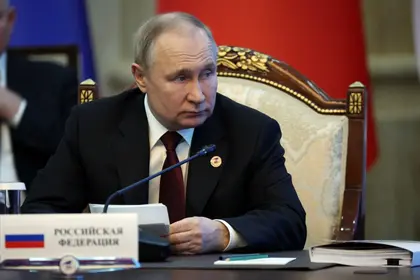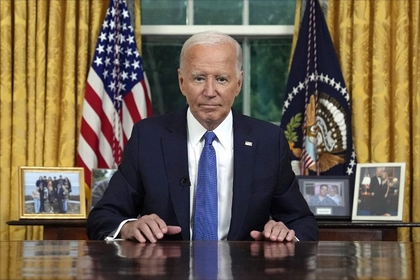Joe Biden and Vladimir Putin are set to give duelling speeches Tuesday promising two starkly differing takes on Russia’s Ukraine invasion, a day after the US president’s surprise visit to Kyiv.
Biden met Ukrainian President Volodymyr Zelensky on Monday -- pledging fresh arms deliveries and “unwavering” American support -- days before the first anniversary of Russian tanks rolling over the border.
JOIN US ON TELEGRAM
Follow our coverage of the war on the @Kyivpost_official.
“One year later, Kyiv stands. And Ukraine stands. Democracy stands,” he said at the Mariinsky Palace, the Ukrainian president’s official residence.
And on Tuesday, from Warsaw’s historic Royal Castle, Biden will “make it clear that the United States will continue to stand with Ukraine... for as long as it takes”, according to National Security Council spokesman John Kirby, who spoke to reporters last week.
In a visit to rally Washington’s eastern European allies, Biden will also meet Polish President Andrzej Duda on Tuesday.
He will also speak by phone with the leaders of Britain, France and Italy, the White House has said. German Chancellor Olaf Scholz is due in Washington on March 3.
“You’ll hear messages in the president’s speech that will certainly resonate with the American people, certainly will resonate with our allies and partners, without question resonate with the Polish people,” Kirby said of the Warsaw address.

Hungary to Block EU Funds For Member States Until Ukraine Allows Lukoil Transit
“And I would suspect that you’ll hear him messaging Mr Putin as well, as well as the Russian people.”
- Chinese concern -
Putin will speak in Moscow a few hours earlier, according to the Kremlin, delivering a state-of-the-nation address that will be largely devoted to the conflict.
In previous addresses, he has railed against NATO’s perceived threat to Russia, and drawn on his country’s history to buttress his rationale for launching the invasion, and sticking with it in the face of unexpected Ukrainian resistance.
The Washington-based Institute for the Study of War has said Putin is “unlikely to announce measures for further escalation of the war in Ukraine, major new Russian mobilization initiatives, or any other significant policy” in the speech, which is delivered to the legislature and televised on national channels.
When it was launched, the so-called special military operation was planned to be a rapid conquest, leading to capitulation and the installation of a pro-Russian regime.
“Putin thought Ukraine was weak and the West was divided,” Biden said Monday. “He thought he could outlast us.”
“He’s just been plain wrong,” he added.
On Tuesday, China said it was “deeply concerned” about the war, which it said was “intensifying and even getting out of control”.
Foreign Minister Qin Gan said Beijing would “urge the countries concerned to stop adding fuel to the fire as soon as possible, to stop shifting the blame to China”, following US claims that Beijing may be considering sending arms to Moscow.
China’s top diplomat, Wang Yi, is due in Moscow on Tuesday for talks, in his final stop of a European tour.
The Kremlin has said Wang may meet Putin during his visit, according to the official TASS news agency.
According to the latest estimates from Norway, the conflict has wounded or killed 180,000 Russian soldiers and 100,000 Ukrainian troops.
Other Western sources estimate the war has caused 150,000 casualties on each side.
- New US military aid -
The United States has provided Ukraine with far more assistance than any other NATO country, with military, economic, humanitarian and other aid now exceeding $100 billion.
During his Kyiv stop -- the first Ukraine trip by a US president since 2008 -- Biden promised $500 million in fresh arms deliveries, mentioning in particular artillery ammunition, howitzers and Javelin anti-tank missiles.
The same day, Japan offered $5.5 billion worth of support.
Biden’s visit was organised in conditions of extraordinary secrecy.
He left Washington in the early hours of Sunday in a plane that had been parked discreetly beside a hangar in the dark with shades drawn. It landed in Poland on Sunday evening.
He was driven to the train platform and quickly boarded the 10-hour overnight service to Kyiv, arriving at 8:00 am local time.
National Security Advisor Jake Sullivan said Washington notified Russia about the trip “some hours before his departure for deconfliction purposes”.
- ‘Good sign’ for Ukrainians -
He said it was “unprecedented” in modern times for a US president to visit the capital of a country at war in which the US military “does not control the critical infrastructure”.
Kyiv residents said they were delighted.
“This means that the Americans are clearly and irrevocably on our side,” said 50-year-old Oksana Shylo.
“It’s a good sign for the Ukrainian people, for Ukraine’s victory,” said businessman Vladyslav Denysenko, 27.
Zelensky said he and Biden also discussed the possibility of supplying “long-range weapons” to Ukraine, a long-standing request from Kyiv that has been met with reticence in Washington, where there is concern that they could be used to strike deep inside Russian territory.
Zelensky hailed the visit as a key sign of support.
“This conversation brings us closer to victory,” he said, calling the trip and the promise of additional US arms supplies “an unequivocal signal that Russian attempts to win will have no chance”.
You can also highlight the text and press Ctrl + Enter






